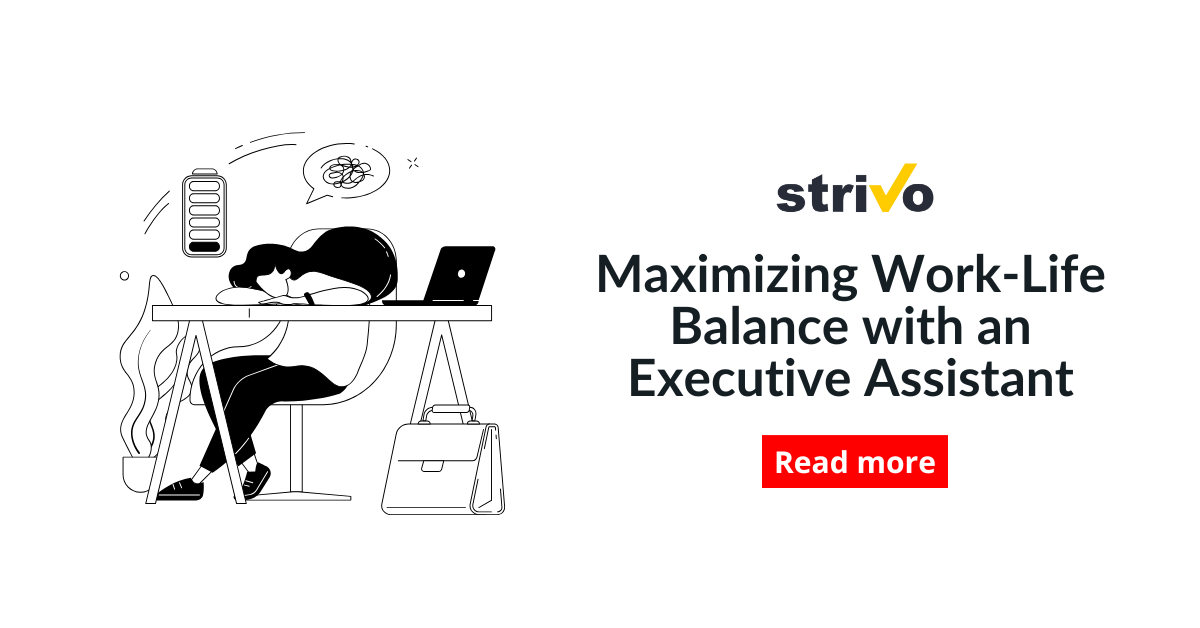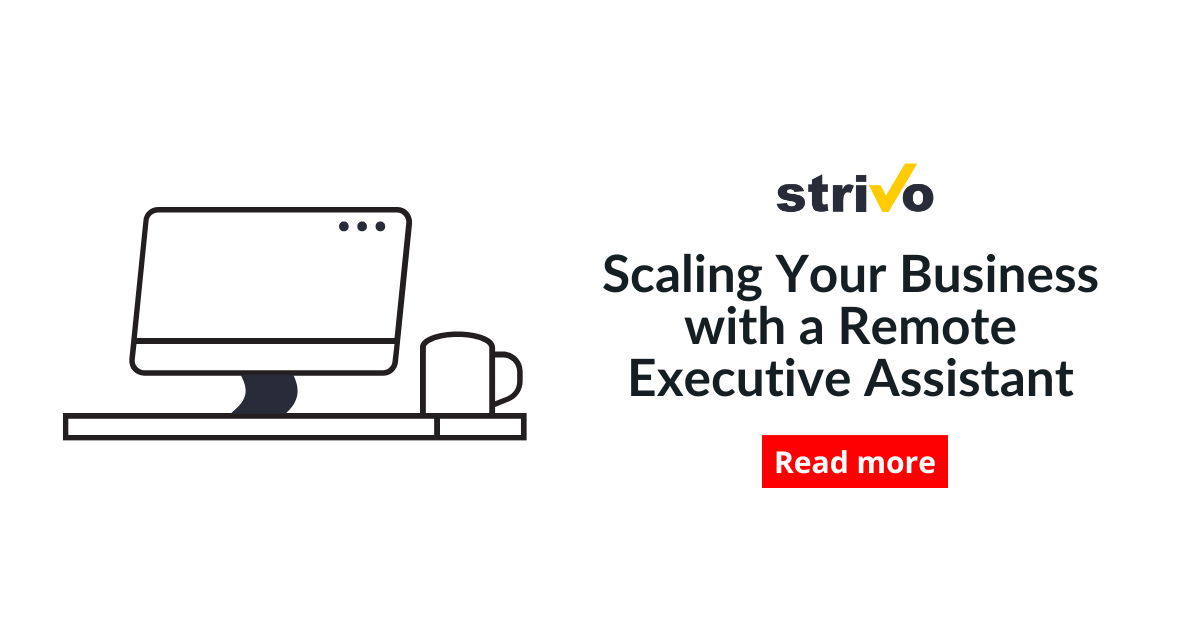In today’s fast-paced business landscape, the role of an Executive Assistant (EA) to the Founder has transformed far beyond traditional administrative tasks. Behind every great Founder is an exceptional EA, silently propelling them to new heights and fueling company growth.
The Founder can step back, trusting that day-to-day tasks are expertly handled. If you’re ready to amplify your productivity and streamline operations, an EA could be the person you need.
Here’s how an Executive Assistant drives results for the Founder and the organization:
1. Maximizing the Founder’s Productive Time
An Executive Assistant does more than manage the Founder’s calendar. They orchestrate it. Every appointment, meeting, and task is filtered through maximizing impact. Forget about mere time management – the real challenge lies in managing a schedule that actively serves the Founder’s specific objectives, boosting their impact and productivity.
For instance, the EA might coordinate back-to-back meetings on related topics to maintain momentum and ensure continuity. They’ll prioritize important meetings, cancel or delegate unnecessary ones, and leave time for the Founder to engage in deep work or creative thinking. Overseeing the Founder’s calendar, their EA tightens up the schedule, guaranteeing that each minute drives the organization forward.
2. Filtering for Strategic Focus
In a world filled with constant communication, the EA acts as the gatekeeper to the Founder’s attention. Critical messages only make it past the EA’s filtering process, each one aligning with the Founder’s plan to drive real progress. When the EA takes charge, the Founder can tune out distractions and focus on what really drives progress
To excel, the EA needs to be in sync with the company’s overall vision, grasp the Founder’s communication habits, and appreciate the subtle dynamics at play with stakeholders. By doing so, they empower the Founder to have game-changing conversations, forge unshakeable alliances, and kick-start business success.
3. Synchronizing Projects for Impact
An Executive Assistant who’s solid at project management can be a total game-changer for a Founder with a non-stop schedule. The EA is more than just a taskmaster – they’re a purpose-driven visionary whomakes sure every project pushes the company forward in a way that matters to the Founder.
As the glue that holds everything together, the Executive Assistant works closely with the Founder to set priorities, iron out wrinkles, and drive projects to successful conclusions. They may even take the lead on specific projects, coordinating team efforts, tracking milestones, and providing regular updates to the Founder. By doing so, the EA helps the Founder stay informed and focused on the big picture while trusting that day-to-day project details are expertly handled.
4. Boosting Confidence in Every Choice through Precision Decision-Making
Perfect decisions rely on thorough preparation, that is why an EA’s contribution in this area is priceless. These behind-the-scenes players research extensively, assembling pinpointed briefs, taking down must-know points, and putting informed clarity at the Founder’s fingertips.
After meetings, the executive assistant steps in to get the ball rolling, making sure everyone stays on track. Founders who courageously own their decision-making process broadcast a level of self-assurance that resonates with others and solidifies their position as inspiring leaders. With an eye on every development, the EA slashes red tape, freeing the Founder to drive progress forward.
5. Crafting Events that Reflect Strategic Vision
Whether it’s a high-profile investor meeting, a team-building retreat, or a product launch event, the EA is instrumental in planning events that align with the Founder’s strategic vision. With full plate management, they sort out spaces, guests, and the moving parts that come with pulling off an epic event.
With a flair for precision, an EA takes care of events that sharply reflect the company’s vision, attracting attendees and leaving an indelible mark. When the company puts on an event, it’s not just about the logistics – it’s a deliberate statement about the founder’s passion for redefining the status quo. As an EA breathes life into an event, it turns into a memorable experience that wraps stakeholders in a warm sense of belonging, and business priorities fall neatly into place.
6. Safeguarding Trust and Confidentiality
Trust and confidentiality are cornerstones of the EA-Founder relationship. Because of its privileged position, the EA is the keeper of many confidential truths – from sensitive financial records to intimate personal details. Safeguarding the Founder’s good name and the company’s strategic assets relies on their ability to handle sensitive information with care.
An EA operates with a high degree of discretion, understanding that any breach of trust could have far-reaching consequences. Protecting the crown jewels of the company – strategies, relationships, and reputation – is their top priority. Knowing that someone has their best interests at heart, the Founder can go forward with bold initiatives, unrestrained by self-doubt or worry.
7. Enabling Sustainable Leadership through Personal Support
The demands of leading a company often spill into a Founder’s personal life, making it challenging to maintain a work-life balance. As the Founder’s right-hand person, an EA assumes a role that extends far beyond just handling tasks, actively helping to sort out personal matters that could otherwise hinder their leader’s effectiveness.
Family events, travel plans, and appointments – the EA has got them all covered, giving the Founder the space to concentrate on their top priority: leading the organization. As the Founder’s right-hand, an EA helps them stay energized. This is essential for meeting the long-term demands of leadership.
The Power of Strategic Partnership
An Executive Assistant to the Founder is more than just a support role; they are a valuable partner whose influence extends across the organization. When the Founder’s creative vision merges with the EA’s tactical expertise, the results are nothing short of remarkable. With the EA handling the details, the Founder can relax and focus on the strategic moves that will push the business ahead.
Be it rapid growth or radical transformation, one thing is certain: the bond between founders and their trusted EAs will be the secret that propels businesses forward. So, if you’re ready to unlock the full potential of your leadership and step your business forward, an Executive Assistant might be the answer. Experience the impact of expert support on your path to success. Ready for a breakthrough? Book a discovery call today!




